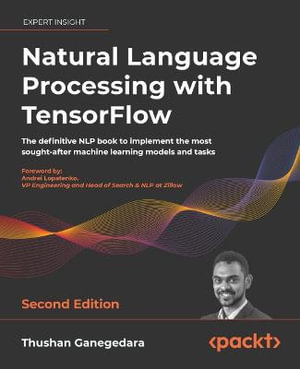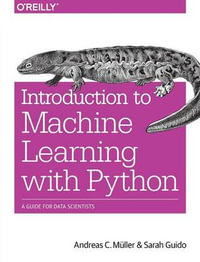
Natural Language Processing with TensorFlow - Second Edition
The definitive NLP book to implement the most sought-after machine learning models and tasks
Paperback | 29 July 2022 | Edition Number 2
At a Glance
Paperback
$83.65
Aims to ship in 7 to 10 business days
When will this arrive by?
Enter delivery postcode to estimate
From introductory NLP tasks to Transformer models, this new edition teaches you to utilize powerful TensorFlow APIs to implement end-to-end NLP solutions driven by performant ML (Machine Learning) models
Key Features:
- Learn to solve common NLP problems effectively with TensorFlow 2.x
- Implement end-to-end data pipelines guided by the underlying ML model architecture
- Use advanced LSTM techniques for complex data transformations, custom models and metrics
Book Description:
Learning how to solve natural language processing (NLP) problems is an important skill to master due to the explosive growth of data combined with the demand for machine learning solutions in production. Natural Language Processing with TensorFlow, Second Edition, will teach you how to solve common real-world NLP problems with a variety of deep learning model architectures.
The book starts by getting readers familiar with NLP and the basics of TensorFlow. Then, it gradually teaches you different facets of TensorFlow 2.x. In the following chapters, you then learn how to generate powerful word vectors, classify text, generate new text, and generate image captions, among other exciting use-cases of real-world NLP.
TensorFlow has evolved to be an ecosystem that supports a machine learning workflow through ingesting and transforming data, building models, monitoring, and productionization. We will then read text directly from files and perform the required transformations through a TensorFlow data pipeline. We will also see how to use a versatile visualization tool known as TensorBoard to visualize our models.
By the end of this NLP book, you will be comfortable with using TensorFlow to build deep learning models with many different architectures, and efficiently ingest data using TensorFlow Additionally, you'll be able to confidently use TensorFlow throughout your machine learning workflow.
What You Will Learn:
- Learn core concepts of NLP and techniques with TensorFlow
- Use statee-of-the-art Transformers and how they are used to solve NLP tasks
- Perform sentence classification and text generation using CNNs and RNNS
- Utilize advanced models for machine translation and image caption generation
- Build end-to-end data pipelines in TensorFlow
- Learn interesting facts and practices related to the task at hand
- Create word representations of large amounts of data for deep learning
Who this book is for:
This book is for Python developers and programmers with a strong interest in deep learning, who want to learn how to leverage TensorFlow to simplify NLP tasks.
Fundamental Python skills are assumed, as well as basic knowledge of machine learning and undergraduate-level calculus and linear algebra. No previous natural language processing experience required.
ISBN: 9781838641351
ISBN-10: 1838641351
Published: 29th July 2022
Format: Paperback
Language: English
Number of Pages: 514
Audience: Professional and Scholarly
Publisher: Packt Publishing
Edition Number: 2
Dimensions (cm): 23.5 x 19.05 x 2.62
Weight (kg): 0.88
Shipping
| Standard Shipping | Express Shipping | |
|---|---|---|
| Metro postcodes: | $9.99 | $14.95 |
| Regional postcodes: | $9.99 | $14.95 |
| Rural postcodes: | $9.99 | $14.95 |
How to return your order
At Booktopia, we offer hassle-free returns in accordance with our returns policy. If you wish to return an item, please get in touch with Booktopia Customer Care.
Additional postage charges may be applicable.
Defective items
If there is a problem with any of the items received for your order then the Booktopia Customer Care team is ready to assist you.
For more info please visit our Help Centre.























